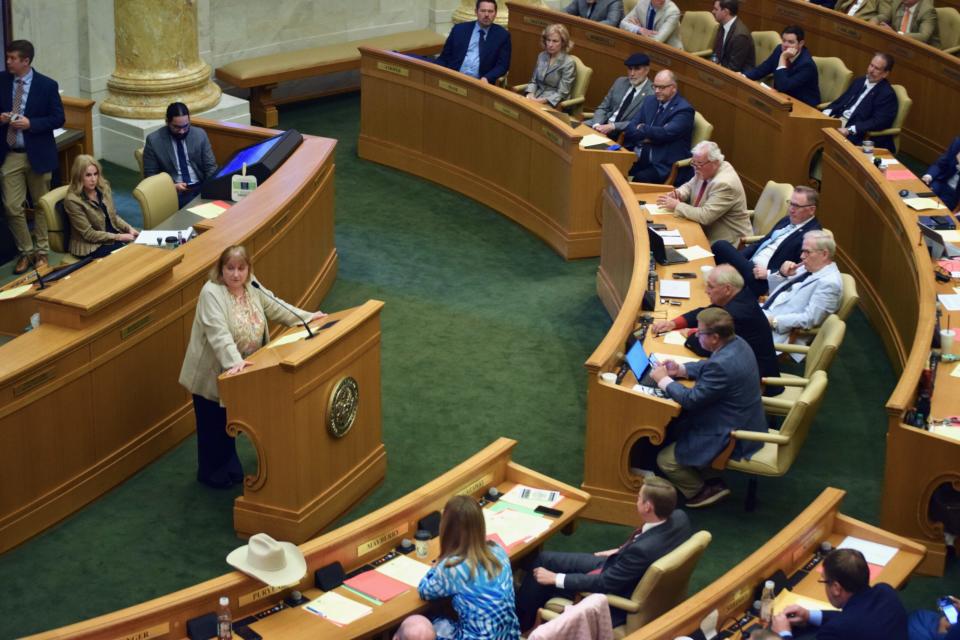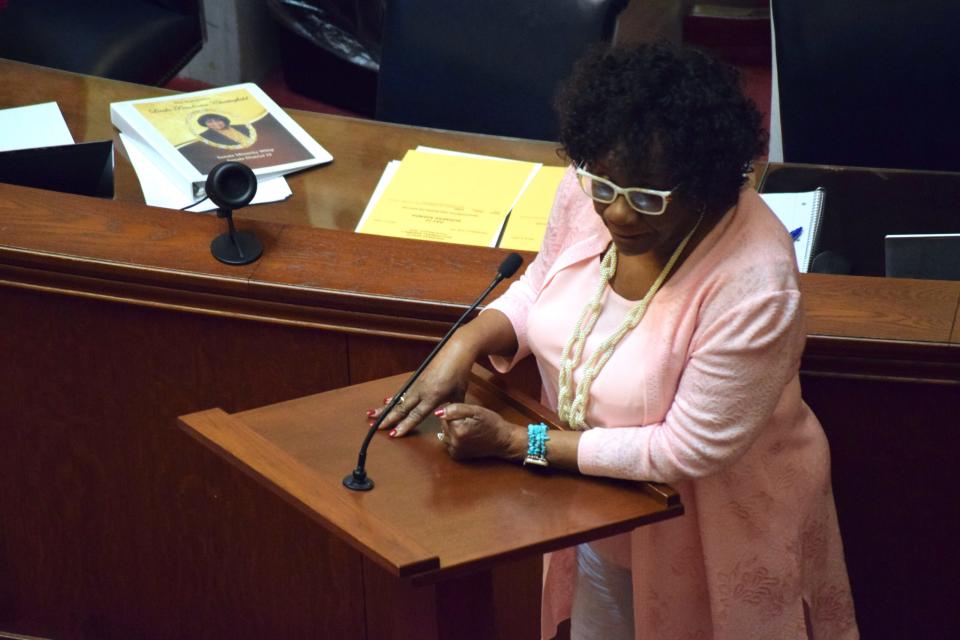SESSION SNAPSHOT: Arkansas lawmakers wrap fiscal session, send budget to governor’s desk

- Oops!Something went wrong.Please try again later.
Arkansas House Speaker Matthew Shepherd, R-El Dorado, speaks to reporters on Thursday, May 2, 2024, the final day of business in the 2024 fiscal session. The Legislature will adjourn sine die May 9. (Tess Vrbin/Arkansas Advocate)
Arkansas lawmakers concluded business in the 2024 fiscal session Thursday and plan to adjourn sine die May 9.
The session lasted a week longer than initially projected, but House Speaker Matthew Shepherd, R-El Dorado, said he believed it went “relatively smoothly.”
The fiscal year 2025 budget, also known as the Revenue Stabilization Act, heads to Gov. Sarah Huckabee Sanders’ desk along with almost all of the remaining appropriations bills for state agencies. As of Thursday, Sanders had signed 136 appropriations bills into law, giving state agencies the authority to spend the money allocated to them in the budget.

Senate President Pro Tempore Bart Hester, R-Cave Springs (John Sykes/Arkansas Advocate)
Also on Thursday, the Senate re-elected its President Pro Tempore, Cave Springs Republican Bart Hester, to a second term in preparation for next year’s regular session.
The House will choose a speaker-designate Thursday before sine die adjournment, said Shepherd, who is running for an eighth House term but has declined a fourth term as speaker.
Republican Reps. Brian Evans of Cabot, Jack Ladyman of Jonesboro and Johnny Rye of Trumann are all vying for the speakership. Shepherd told reporters that he would not publicly predict who will win the gavel.
1) Notable appropriations
The Revenue Stabilization Act that passed the Legislature this week was nearly identical to the budget that Sanders initially proposed in March.
The $6.3 billion general revenue budget has a projected surplus of nearly $377 million. The proposed 1.76% increase of $109 million compared to the current fiscal year will be a significantly smaller increase than previous years’ budgets, which have been around 3%.
About $100 million of the budget increase supports initiatives created last year by the LEARNS Act, Sanders’ signature legislation that changed several aspects of the public education system. Educational Freedom Accounts, the LEARNS Act’s new school voucher program, will receive $65.8 million, while $34.2 million will support the minimum $50,000 yearly wages for teachers, according to the Department of Education’s appropriations bill.
Appropriations bills need a three-fourths majority vote to pass each chamber: 76 votes in the House and 27 votes in the Senate. Most of them moved through the Legislature without fuss, but two met opposition in the House.
On Wednesday, the chamber passed Arkansas PBS’ appropriation after two failed attempts for the second consecutive fiscal session. All of the House members that voted “no” or “present” all three times were Republicans. Other members of the party urged their colleagues to give the public television network its spending authority, citing its availability to communities without reliable internet access and its maintenance of the state’s emergency alert system.
Last week, a proposal to reduce Arkansas PBS’ appropriation didn’t pass the Joint Budget Committee — also for the second fiscal session in a row. Jonesboro Republican Sen. Dan Sullivan’s proposal would have reduced the agency’s spending authority for private funds by 20%, from $8.96 million to $7.17 million.
Shepherd was one of four Republicans to join Democrats in voting against Sullivan’s amendment on April 25. He said Thursday that he was “concerned about the precedent” that the Legislature would have set by creating such authority over an agency’s private funds.
Another state agency’s spending authority remained up in the air as of Thursday. The House rejected the appropriations bill for the Game and Fish Commission after 37 members voted no, 32 voted yes, 18 did not vote and 13 voted present.
Rep. Frances Cavenaugh, R-Walnut Ridge, said she disapproved of an amendment added to the bill Tuesday that would allow the commission director’s salary to increase to $190,000 per year. The secretaries of several cabinet departments, including Corrections, Agriculture and Finance and Administration, make less than that amount, she said.
“This amendment could have been addressed earlier on in the session,” Cavenaugh said. “…The proper way to do things is not to sneak an amendment onto an appropriation at the last minute and act like [Washington] D.C.”

Rep. Frances Cavenaugh, R-Walnut Ridge, addresses the Arkansas House on May 2, 2024. (Antoinette Grajeda/Arkansas Advocate)
Rep. Lane Jean, R-Magnolia, the House chair of the Joint Budget Committee, reminded House members that denying the Game and Fish Commission its spending authority would lead to the closure of public lands and the inability to renew hunting and fishing licenses.
Shepherd said he is hopeful that enough members will have changed their minds by May 9 to pass the appropriation before sine die. The bill passed the Senate on Wednesday.
Jean said either an extended or special session will be necessary to resolve the Game and Fish appropriation if House members do not pass it by May 9. The session began April 10, and three-fourths of each chamber must approve extending the session beyond its 30-day maximum.
2) Non-budgetary bills
The Legislature doesn’t usually take up bills unrelated to the state budget during the fiscal session, but two-thirds of lawmakers in each chamber agreed in April to discuss potential regulations on cryptocurrency mines and pay raises for state employees.
The three resulting bills are now on Sanders’ desk. She pitched the revamp of the state’s pay plan in March, advocating to increase all executive branch employees’ pay by up to 3%.
The Joint Budget Committee removed a provision to raise the minimum wage for those employees to $15. The committee also amended the bill to increase the maximum salary of all current pay grades by 10% and create special compensation awards for those who complete special projects beyond the scope of their typical responsibilities.
Additionally, cryptocurrency regulations became a priority for the Legislature in light of Act 851 of 2023, or the Arkansas Data Centers Act, which limited local governments’ ability to regulate cryptocurrency mining operations.
Crypto mines are large groups of computers that harvest digital currency and are often located in rural areas because of the space they take up. Officials have expressed frustration about how quickly Act 851 moved through the Legislature last year and have raised concerns over the mines’ potential foreign ownership and national security risks.
Senate Bill 78 would place noise limits on crypto mines, prohibit them from being owned by certain foreign entities and allow local governments to pass ordinances regulating the mines. Senate Bill 79 would require crypto mines to be licensed by the state Oil and Gas Commission under the Department of Energy and Environment.
Sen. Joshua Bryant, R-Rogers, co-sponsored both bills and was also a lead sponsor of Act 851. The bills met much debate but few opponents while moving through committee and both chambers.
There are crypto mines in DeWitt and in the Bono community near Greenbrier, and an out-of-state entity has attempted to start a crypto mine near Harrison.
Sen. Bryan King of Green Forest and Rep. Ron McNair of Alpena, both Republicans who represent Harrison, voted for SB79 and against SB78. King sponsored six resolutions to introduce his own proposed crypto regulations, claiming the two that passed didn’t go far enough, but none met the required two-thirds threshold to pass each chamber in April.
Several lawmakers have said there will likely be more crypto mining legislation proposed in the 2025 legislative session, and King has called for a special session later this year to take up the issue.
Shepherd said it’s likely that officials will wait to see the impact of the two bills, which Sanders said she will sign into law, before deciding whether to have a special session instead of waiting until January to propose new crypto regulation bills.
He also said it was for the best that only a few non-fiscal bills were introduced and considered this fiscal session.
“I think we struck the right balance there,” Shepherd said. “…If we get too far down the road of bringing up a number of substantive bills, eventually you reach the point where you’re essentially allowing everything to be filed. I don’t think that’s what the voters had in mind when they approved the fiscal session [in 2008].”

Rep. Vivian Flowers, D-Pine Bluff (Arkansas Legislature)
3) Parting words
In Thursday’s final minutes of the session, Democratic Rep. Vivian Flowers addressed the House ahead of her departure in January. She has declined to run for a sixth term and is instead running for mayor of her hometown.
“I consider it a great privilege to have served with so many people who have come in and out of these halls,” Flowers said. “…Should I win the general election and be sworn in as mayor of Pine Bluff, you won’t see the last of me, because I will be here asking you all for help.”
Meanwhile, the Senate took time to honor Minority Whip Linda Chesterfield, D-Little Rock, who will also leave the Legislature in January. The 76-year-old will have served 14 years in the Senate and previously served six years in the House.
“You started out a teacher and never stopped teaching — teaching us in this chamber time and again what it means to educate, to dedicate and to deliberate,” said Senate Minority Leader Greg Leding, D-Fayetteville.

Sen. Linda Chesterfield, D-Little Rock, addresses the Arkansas Senate on May 2, 2024. (Antoinette Grajeda/Arkansas Advocate)
Each of Chesterfield’s fellow senators expressed appreciation for her leadership and friendship and presented letters nominating her to the Arkansas Black Hall of Fame. She expressed her appreciation in turn with a short speech she concluded with a Bible verse: “I have fought the good fight, I have finished the race, I have kept the faith.”
“I love you, and there’s not a thing you can do about it,” she told her colleagues, receiving applause in response.
Three-term Rep. Jamie Scott, D-North Little Rock, is running unopposed to succeed Chesterfield.
GET THE MORNING HEADLINES DELIVERED TO YOUR INBOX
The post SESSION SNAPSHOT: Arkansas lawmakers wrap fiscal session, send budget to governor’s desk appeared first on Arkansas Advocate.

